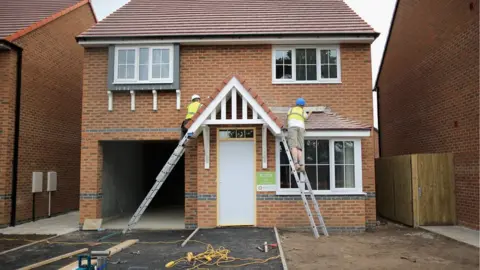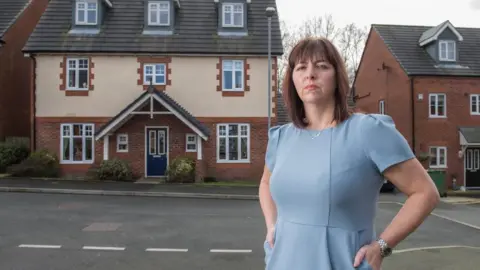Leasehold campaigners welcome new changes
 PA Media
PA MediaTwo big players in the leasehold sector have agreed to change the way they operate, following an investigation by the competition watchdog.
Housebuilder Persimmon will allow its leaseholders to buy the freehold of their property at a discount.
Insurance company Aviva, which buys leaseholds from house builders, will repay homeowners who saw their ground rents double.
Campaigners for leaseholders said the commitments were a "massive milestone".
The Competition and Markets Authority (CMA) launched its investigation into leaseholds in 2019 because it was worried that leaseholders were facing huge and unexpected increases in the cost of buying a freehold or massive increases in ground rents.
It said the said the commitments by Persimmon and Aviva were a "real win".
CMA chief executive Andrea Coscelli said the watchdog now expected other housing developers and investors to take similar action.
"This is a real win for thousands of leaseholders - for too long people have found themselves trapped in homes they can struggle to sell or been faced with unexpectedly high prices to buy their freehold.
"But our work isn't done. We now expect other housing developers and investors to follow the lead of Aviva and Persimmon. If not, they can expect to face legal action."
What is a leasehold?
With a leasehold, the person owns a lease which gives them the right to use the property. But they still have to get their landlord's permission for any work or changes to their homes.
When a leasehold flat or house is first sold, a lease is granted for a fixed period of time, typically between 99 and 125 years, but sometimes up to 999 years - although people may extend their lease or buy the freehold.
But leasehold house owners are often charged expensive ground rent as well as fees if they want to make changes to their homes. A leasehold house can also be difficult to sell.
Under the new commitments Aviva will remove ground rent terms the CMA considers unfair and repay homeowners who saw rents doubled.
In a statement Aviva said it had voluntarily agreed to amend a "small proportion" of leases it had acquired with terms which cause rents to double every 10 or 15 years. The agreement affected about 1,000 leases or just over 2% of those held by the fund.
The CMA's George Lusty told the BBC: "If Aviva is now the freeholder for your property and your lease contains a term that doubles the ground rent every ten or 15 years, that doubling won't apply, so you'll just pay the initial ground rent that you signed up to at the beginning and if you've already started to pay an increased fee, they'll refund that."
 Getty Images
Getty Images
 Jo Darbyshire
Jo Darbyshire Jo Darbyshire, a co-founder of the National Leasehold Campaign, originally had a ground rent that doubled with developer Taylor Wimpey.
She bought the house near Bolton in 2010 for £400,000 - and two years after that Taylor Wimpey sold the leasehold to Adriatic Land, now held by a division called Longharbour.
"The price to buy [the freehold] absolutely rocketed from £5,000 to £50,000 and it has since come down to £30,000."
Jo says she used Taylor Wimpey's ground rent assistance scheme which was £750 towards expenses and she didn't have to pay to have the lease converted from the one which had doubled to one that converts to rises linked to RPI inflation.
She is now planning to speak to her solicitor to work out whether her best option is to try and buy the freehold at the original price or lower.
"It's good that Aviva has set this precedent, but whether or not [the firm that holds my] freehold will join them is another question," she adds.
Taylor Wimpey said: "We will continue to engage with the CMA and, as previously announced, we will work with them to find a satisfactory resolution."

Claire Stevens, from Lancaster, bought a £190,000 Persimmon property in 2017 and bought the freehold in 2019 for £3,750 - which 25 times the ground rent.
She said she rang the helpline today to ask if she could expect a refund of £1,750 but they didn't know.
"We bought the freehold for house as soon as we could," she says.
"I hope that this is a genuine offer, not just a ploy to stop them being investigated further," Claire adds.
Fair deal
Persimmon Homes has extended its existing Right to Buy scheme to cap the purchase price of a freehold at £2,000. It said the extended scheme applied to any leases sold on or after 1 January 2000 and would run until 31 December 2026.
It said customers who had already acquired their freeholds from Persimmon under the existing Right to Buy scheme, and who still own the freehold, could apply to be reimbursed for the difference between the price paid and £2,000.
Persimmon group chief executive Dean Finch said the agreement showed the company's "determination to operate with integrity".
"Building on our existing Right to Buy scheme, this agreement provides a fair deal for all leaseholders of Persimmon built houses, extending the opportunity to purchase their freehold at a price well below market value."
Allow X content?
Mr Lusty said both companies were required to keep the CMA informed about the changes they were making. "We'll absolutely make sure that they stick to that and of course we're prepared to intervene again through court action in necessary to make sure they stick to what they've committed to do."
The National Leasehold Campaign, many of many of whose members gave evidence to the CMA, tweeted that the watchdog had secured "landmark commitments for leaseholders. Another massive milestone. Persimmon & Aviva have eventually done the right thing at last, now other developers & freeholders MUST FOLLOW."
The CMA launched enforcement action against four housing developers in September 2020. In addition to Persimmon, these were Countryside Properties, Taylor Wimpey and Barrett.
It has also been investigating investment firms Aviva, Abacus Land, Adriatic Land and Brigante Properties which bought leasehold contracts from Countryside and or Taylor Wimpey.
Investigations are continuing into all of them except Persimmon and Aviva.


The watchdog is taking a drip-drip approach in this long-running investigation. They are hoping that getting a few companies to agree to change their ways will pressure others to do the same without the need for costly court cases.
It's not an easy task because there are now a lot of players in this market. The big developers began the trick of sneaking high ground rents into contracts, often without flagging it to buyers. But over time some of these lucrative contracts have been sold on to investment companies looking to profit from them.
The pension firm Aviva owns just under 10% of those problematic contracts, with charges that double within 15 years. Their change of heart will certainly have a big impact on the 1,000 homeowners who have been paying the exorbitant bills, but it doesn't fix the problem for the other 12,000 households struggling to pay increasing ground rent on top of their mortgages.
The government says it planning to ban ground rent from future contracts, but that won't help those who have an existing problem, unless the watchdog does more to force other builders and investment firms to change their contracts too.

Mr Lusty said: "We hope today's announcement will send a clear signal to other housing developers and investors that they need to sort out this really difficult issue for leasehold home owners."
The government, which asked the CMA to carry out the investigation, welcomed the agreement.
Housing secretary Robert Jenrick said the settlement with Aviva and Persimmon was a "hugely important step and demonstrates our commitment to support existing leaseholders who may have been mis-sold properties".
"We have also introduced new legislation that will protect future homeowners by restricting ground rents in new leases to zero and I would strongly urge other developers to follow suit in amending their historic practices."
Mike Amesbury MP, Labour's shadow housing minister, said the change was welcome but "further highlights the injustice faced by homeowners already trapped in our feudal leasehold system".
He said: "The government has long promised reform, but their upcoming bill is a missed opportunity to help existing leaseholders... The Government must go further and faster to help existing leaseholders."
